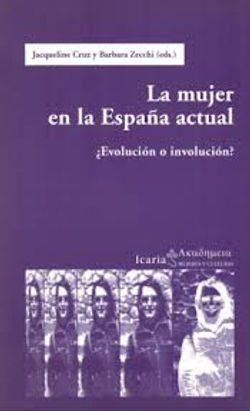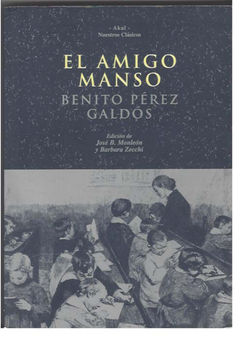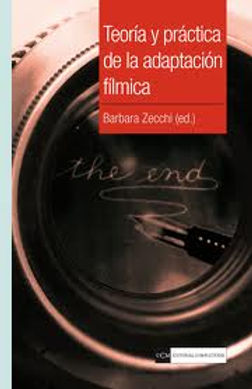BARBARA
ZECCHI
Raquel Medina, Barbara Zecchi (eds). Tecnologías de la edad. Editorial Comares, Granada, 2023. ISBN 978-84-1369-551-8
Technologies of Age is an essential volume for transcending the dominant conception of aging fostered by hegemonic filmic discourses, which contributes to the invisibilization and homogenization of the elderly and the demonization of old age. Age is a universal intersection, but not a unidimensional one, and therefore the experience of aging impacts on human beings in different ways, so that cinema has the power to implant other concepts of age that denaturalize the hegemonic ones. The first part of Technologies of Age brings together a series of fundamental theoretical descriptions that form the clearest lines of theoretical approach to the cultural representations of aging. The second part is dedicated to unraveling the spectrum of the multiple forms of aging according to their intersection with diverse cinematographic discourses and geographical contexts. The last part of the volume includes, as an epilogue, interviews with some of the people in charge of the organization of two film festivals on aging, which contribute to the visibility of the diversity of the experience of aging and its celebration.

Barbara Zecchi, Raquel Medina, Cristina Moreiras-Menor, María Pilar Rodríguez, eds.
Envejecimientos y cines ibéricos
Tirant Lo Blanch Humanidades, 2021
ISBN: 978-84-18802-20-1
The generalized increase in life expectancy has both positive and negative consequences in the family, social, economic, political and cultural spheres, and has given rise in recent years to an extraordinary boom in studies on aging in multiple disciplines, including film. This volume brings together works that analyze the relationship between old age and its visual expression in the various film productions of the Iberian Peninsula. In particular, its chapters present a diversity of reflections around this theme in some important films by "auteurs" (Josefina Molina, Pilar Miró, Isabel Coixet, Pedro Costa, Pedro Almodóvar, Ventura Pons and Albert Serra, etc. ); they discuss the representation of the "mature" body (the lack of symmetry between aging actors and aging actresses, menopause, old age for transgender subjects, the perishable nature of our existence); they approach the loss of memory, both collective and symbolic (historical memory) and personal and physical (Alzheimer's and other dementias); and finally, they focus on the expiration of celluloid, the aging of cinema itself as a medium.

Rebeca Maseda, María José Gámez, Barbara Zecchi, eds.
Gender-Based Violence in Latin American and Iberian Cinemas
Routledge, 2020
Gender-Based Violence in Latin American and Iberian Cinemas reconsiders the intersection between violence and its gendered representation. With essays from diverse cultural and institutional backgrounds, this collection analyzes a wide range of films in Latin America and Iberia. The volume uses varied perspectives, such as feminist, postcolonial, and queer theory, to address issues such as the visual configuration of power and inequality, the objectification and invisibilization of the resistance of women and LGBTQ subjects, the role of women filmmakers in transforming hegemonic narratives of violence, and the subversion of common tropes of gender violence.
Zecchi, Barbara, ed.
Tras las lentes de Isabel Coixet: Cine, compromiso y feminismo
Prensas Universitarias Zaragoza,
Zaragoza: 2017
Behind the Lenses of Isabel Coixet: Cinema, Activism, and Feminism is the most comprehensive study to date of the work of Isabel Coixet, one of the most prolific, versatile and cosmopolitan filmmakers on the current film scene. The volume examines the Catalan director's production from four different angles. The first part covers the general themes of her production: places, looks, textures, silences and sounds, and her dialogue with feminist film theory. The second dissects in detail his fiction films, from Too Old to Die Young (1989) to Learning to Drive (2014). The third focuses on documentaries, his most explicitly social work. And the last one offers a look at the filmmaker beyond her film work, thus completing her portrait.
Zecchi, Barbara.
La pantalla sexuada.
Madrid: Cátedra, 2014
The Gendered Screen deals with five central themes of feminist film theory (space, authorship, pleasure, body and violence) with the intention of revealing the dynamics used in cinema to disappropriate the feminine. The title of this volume refers to this disappropriation, to a transnomination that is the product of various practices (epistemologies, institutionalized discourses and gender technologies) that obstruct the feminine by displacing it to the masculine, or, in other words, universalize the masculine. The purpose of this book is to denounce this phenomenon that has made and continues to make invisible the feminine presence in the seventh art and to historicize cinema from a gender approach.
Zecchi, Barbara
Desenfocadas. Cineastas españolas y discursos de género
Barcelona: Icaria, 2014
Cinema has " blurred " the reality of women by creating stereotypical female images on the screen and, at the same time, by erasing from historiographies their presence in the field of filmmaking. This volume aims to bring them back into focus, on the one hand, by denouncing the filmic representation of the Eternal Woman of patriarchal society, which has little to do with authentic female subjects and, on the other, by rescuing the work of four generations of female filmmakers, from the first shadows that have been victims of amnesia about female participation in the beginnings of the seventh art, to the filmmakers of today who have formed CIMA, the Association of Women Filmmakers and Audiovisual Media, since always, throughout the history of cinema, women have been excluded or discriminated against in an industry dominated by men.
Zecchi, Barbara, ed.
Gynocine: Teoría de género, filmología
y praxis cinematográfica
Zaragoza: Publicaciones Universidad Zaragoza, 2013
In the face of the crisis in naming of feminist film theory and the limitations of the terms "feminist cinema," "women's cinema," and "women's cinema," this volume defines the film corpus under study as GYNOCINE. Gynocine avoids the implications of "feminist," since not all cinema directed by women is necessarily feminist, nor is all feminist cinema directed by women. A film can be feminist regardless of the intentions of its director or cinematographer. Gynocine dispenses with a direct link to the strictly biological, because its products do not have to be solely and exclusively films directed by women. If not all cinema directed by women is feminist, all films directed by women belong to gynocine because no woman, not even the most fervent defender of the patriarchal system, is exempt from a system of practices and institutions that discriminate and oppress in terms of sex and gender. And finally, gynocine is not limited to the production of female directors, but includes other "auteurs". The figure of the director-auteur (by default, male) must be downplayed in order to recognize that the filmic device is the product of a team, and not of a single mind
Zecchi, Barbara (ed.)
Teoría y práctica de la adaptación fílmica
Madrid: Editorial Complutense, 2011
ISBN: 9788499381305, 320pp.
Theory and Practice of Film Adaptation covers different theoretical studies from the classics by André Bazin and George Bluestone, to the recent works by Linda Hutcheon and Robert Stam, focusing on practical examples of Spanish cinematography. The common denominator of the articles included in this volume is the approach to adaptation as multiplication, that is, as a non-hierarchical articulation of a work. The essays are arranged chronologically (from the adaptation of Golden Age classics to the transposition to the screen of current works) and thematically (memory, politics, gender issues). The book is not limited to the analysis of the film adaptation of literary works, but also deals with the study of celluloid or digital versions of other texts, such as comics and video games. Beyond fidelity as an essential criterion for evaluating artistic content, each essay analyzes the fundamental differences between the written word and the visual image, and reflects on the ideological implications of such adaptations.
Barbara Zecchi , Jacqueline Cruz, eds.
La mujer en la España actual ¿Evolución o involución?
Barcelona: Icaria, 2004
ISBN: 978-84-746-705-6, 443 pp.
The death of Franco in 1975 marked the beginning of a series of dizzying changes -a kind of revolution- that almost immediately granted women legal equality with men. But today, more than a quarter of a century later, real equality is far from being achieved, as can be seen in the high percentage of women who still devote themselves exclusively to domestic tasks, the "glass ceiling" that slows down their ascent in the professional and political world, and their high rate of unemployment. But the worst thing is that, as is amply demonstrated throughout this volume, in recent years we have witnessed an involution in the situation of women. Feminism has practically ceased to exist as a political discourse and practice, and physical violence against women has increased alarmingly. Political and cultural discourses are multiplying, proposing a model of woman who, although inserted in the public sphere, longs for the private sphere, while rediscovering traditional "values" such as marriage, domesticity and, above all, motherhood.

Medina, Raquel and Barbara Zecchi (eds.)
Sexualidad y escritura (1850-2000)
Barcelona: Anthropos, 2002
ISBN: 9788476586372, 318 pp.
The aim of this work is to illustrate the conceptual historicity of writing in sexual terms, and to contextualize and qualify the universality of the paradoxical meaning of feminist literary theories and their application to the specific case of Spain.
This volume brings together fifteen studies that analyze from a feminist literary theory approach the development of the relationship between writing and sexual gender in Spain from the mid-nineteenth century to the present. Its objective, therefore, is to study the historical evolution of the gender issue in the field of writing, which includes not only female writing but also male-authored texts.

Monleón, José B. y Barbara Zecchi (eds.)
Benito Pérez Galdós El amigo Manso,
Madrid: Akal, 2002
ISBN: 978-84-460-1889-6, 344 pp., Introducción de 83 pp.
La abundante obra de Benito Pérez Galdós representa uno de los momentos álgidos del realismo español. El Amigo Manso (1882) es una novela fundamental en la producción galdosiana, en la que se explora no solo el "gran tema de la educación", sino también las paradojas de la relación entre arte y realidad, entre ficción y verdad y entre hombre y mujer. En esta edición se presta particular atención a las implicaciones genérico-sexuales de las ideas estéticas y sociales de Galdós

















